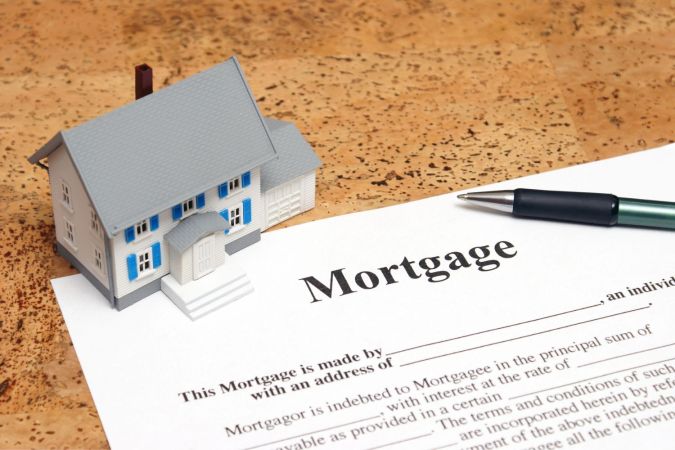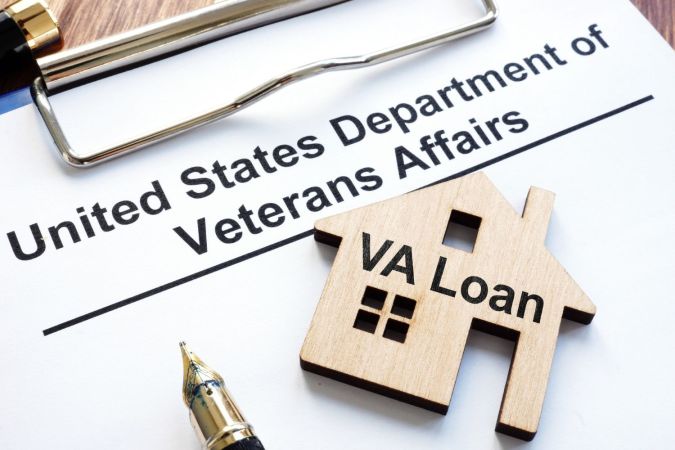We may earn revenue from the products available on this page and participate in affiliate programs. Learn More ›
Q: My husband and I are hoping to buy a new home in a luxury neighborhood. Our mortgage broker told us the house we’re looking at may not qualify for a conventional mortgage and might require a jumbo loan because of the price. What is a jumbo loan, and how do we get one?
A: One of the most common types of home loans is a conventional conforming mortgage. However, these loans are only available for homes up to a certain value. High-dollar properties won’t qualify for a conventional conforming mortgage. Home buyers who are hoping to buy an expensive home that falls outside of the maximum conventional loan limit may be able to obtain a jumbo loan to secure the financing for their new home.
This can lead to more questions, such as “What is a jumbo loan, and how is it different from a conventional mortgage?” Jumbo mortgages offer higher loan amounts for well-qualified buyers and are usually reserved for homes that exceed the maximum conventional loan limit.
Jumbo loans are designed for homes that exceed the maximum conventional loan amount of $647,200 and do not qualify for a conventional conforming loan per Federal Housing Finance Agency (FHFA) rules.
Many homes for sale are priced within the limits of conforming loans. This means buyers can take out a conventional conforming mortgage for the property. The exact limit for conforming loans is set each year by the Federal Housing Finance Agency. When a home is sold at a price higher than this limit, the home doesn’t qualify for a conforming mortgage, and the buyer may need to use a jumbo mortgage to buy the home instead.
So what is a jumbo mortgage? Also called a nonconforming mortgage, a jumbo loan is designed for homes that exceed the conventional conforming mortgage limits. If the conforming loan limit was $647,200, a borrower looking to purchase an $800,000 home without a significant down payment would need to apply for a jumbo loan.
Although jumbo loans often offer terms that are similar to those of conforming loans, they usually have stricter requirements. A jumbo loan lender may require borrowers to provide more confirmation that they can pay for their new home. Additionally, home buyers may have to shop around longer to choose a mortgage lender willing to offer them a jumbo loan.
Some high-cost areas may have higher conforming loan limits, meaning buyers in those areas may still be able to get a conventional loan even if their home’s sale price is higher than the FHFA limit.
There are variations in jumbo loan limits by state. It can even vary by county within a state. Higher-cost areas may also have higher limits on conventional loans. This means buyers in states or counties with higher home prices may still be able to use a conforming loan to purchase their new home.
Consider this example: There are two homes listed at the same price, but in different states. The first home—Home A—is within a high-cost state and county. It qualifies for a conforming loan because the county has a higher conforming loan limit. Home B, however, is not located in a high-cost area; it’s simply a luxury home in an area that uses the FHFA conforming loan limit. Although the price is the same for each home, a buyer would likely need a jumbo loan to purchase Home B.
In addition to designating high-cost areas, the FHFA uses a special set of factors to determine the conforming loan limit outside of the continental United States. Hawaii, Alaska, and certain U.S. territories, such as Guam, have higher conforming loan limits than most states on the mainland. Just like high-cost areas of the continental U.S., high-cost areas in these states and territories could have even higher conforming limits. For example, some areas of Hawaii have conforming loan limits well above the FHFA standard.
Unlike conventional mortgages, jumbo loans can’t be guaranteed by Fannie Mae or Freddie Mac, which makes them riskier for lenders.
The main difference between a jumbo vs. conventional loan is the ability of the lender to sell the mortgage to Fannie Mae or Freddie Mac. Fannie Mae and Freddie Mac are government-sponsored enterprises (GSEs), which essentially means they’re businesses run by the federal government. These GSEs were designed to help banks have enough cash on hand to lend money to Americans who want to buy a home. Many banks and lending institutions sell the mortgages they originate to one of these GSEs, which in turn allows them to fund more mortgages.
A loan is considered “conforming” if it falls within the requirements for sale to Fannie Mae or Freddie Mac. Conforming loans are guaranteed by the GSEs and lower the risk for the lender because the lender knows it can sell the loan to the government. Any loan that doesn’t meet the requirements is considered nonconforming and cannot be sold to Fannie Mae or Freddie Mac. Jumbo loans fall outside of the requirements because the loan amount is above the Fannie Mae and Freddie Mac limits.
Lenders usually require an additional appraisal to verify the value of the home before approving a jumbo loan.
In the traditional home-buying process, the buyer pays for an appraisal on the home they wish to purchase. An independent appraiser goes over the property and assesses its features and conditions. Generally, more features or amenities will increase the value. However, the condition and age of the property also affect the appraisal value.
For example, a home with three bedrooms is often appraised higher than one with two bedrooms. If the 3-bedroom home is run down, however, it could easily appraise lower than a newer 2-bedroom home. The appraiser also compares the home with other homes for sale or recently sold in the area to help determine the value of the home in relation to the current local real estate market.
The best mortgage lenders are careful to avoid lending money to underqualified borrowers. Additionally, lenders use the appraisal process to see if a property is worth the asking price in the current market. Jumbo mortgage lenders take on a lot more risk than conforming mortgage lenders, so they need to ensure that the property being purchased is worth the loan amount. They may ask borrowers to pay for a second independent appraisal to verify the value of the property.

Jumbo loans are typically available with either a fixed or variable interest rate and in a variety of term lengths.
Many home buyers are surprised to learn how many options they have when choosing the terms of their home loan. Mortgages generally come in a variety of interest rates and term lengths to best fit individual buyers’ needs. Jumbo loan lenders often offer similar interest rate types and loan lengths.
A fixed-rate mortgage is one of the most popular types of home loans, both for home buyers looking for conforming and jumbo loans. In this type of mortgage, borrowers pay a fixed, or set, interest rate for the duration of the loan. Generally, neither a lender nor a borrower can change the interest rate unless the loan is refinanced. This makes it easier for borrowers to budget their mortgage costs and is a straightforward approach to financing a house purchase.
Some buyers choose a variable interest-rate mortgage instead of a fixed rate. Variable-rate mortgages, or adjustable-rate mortgages (ARMs), have a fixed interest rate for the first few years of the loan. After the initial loan term is up, the lender can adjust the interest rate of the loan, often once per year. For example, an ARM might have a 3 percent interest rate for the first 7 years of the loan. After the 7-year period is over, the lender can move the interest rate up or down, depending on the current rate landscape. Buyers who choose ARMs usually do so to get a lower interest rate during the first few years of homeownership, since they can refinance their loan (or even sell their house) once the 7 years are up. This can be a good way to save money on interest costs if the borrower plans to sell the home before the variable interest-rate period begins.
Because jumbo loans are seen as riskier, they tend to have stricter qualification requirements, such as a credit score over 700 and a low debt-to-income (DTI) ratio.
A credit score is a three-digit number that helps lenders evaluate a borrower’s ability to repay the money they borrowed. Several different factors make up a credit score, but one of the most important is payment history. A borrower’s payment history tells a lender whether or not they have a record of repaying lenders on time. Borrowers who are buying a home that meets conventional conforming limits may be able to get approval with a good credit score. Some lenders may even work with borrowers who have lower scores to help them purchase a home.
Borrowers looking to purchase a home with a jumbo loan, however, will often need a jumbo credit score to match. As jumbo loan lenders cannot sell loans to Fannie Mae or Freddie Mac, they’re taking on a higher level of risk. They reduce this risk by only offering jumbo loans to borrowers with excellent credit scores. A higher credit score often indicates that the borrower has the discipline and funds to repay the jumbo loan.
Another factor lenders use when determining if someone qualifies for a jumbo loan is the debt-to-income ratio (DTI). A borrower’s DTI shows their income compared to their other debts. For example, a person makes $5,000 a month and pays $2,000 per month toward debt like car payments or student loans. Their DTI ratio is 40 percent. Lenders use DTI to help decide if they should loan money to a borrower, but borrowers can use their DTI to help determine how much house they can afford. Although DTI ratio requirements vary among lenders, most require a lower DTI to secure a jumbo loan.
Borrowers who have cash reserves in the bank are more likely to qualify for a jumbo mortgage loan.
Having an excellent credit score and a low debt-to-income ratio may not be enough for some borrowers to qualify for a jumbo loan. Many jumbo loan lenders want to be sure they only lend large amounts of money to home buyers who can afford to repay the loan. One way that lenders check whether a borrower can pay back their jumbo loan is by looking at cash reserves and additional assets.
Cash reserves are any savings and investments a borrower could use to pay down the loan if they needed to. If a borrower has a lot of extra money in a savings account, the lender may be more willing to offer them a jumbo loan. That’s because the borrower could use the extra cash to help pay for the loan if something happened to their regular income. For instance, a buyer wants to purchase a home with a jumbo loan of $800,000. They have excellent credit and a low DTI. Additionally, they have a savings account with $500,000. If they lose their job or ability to make an income, this cash reserve could help cover the jumbo loan payments until they find a way to sell the home or replenish their income. Some lenders may consider other assets that could be liquidated—like fine art or luxury jewelry—as reserves for a jumbo loan.
Lenders typically require a higher down payment for a jumbo loan than for a conventional conforming loan.
The down payment requirement for a mortgage is generally determined by calculating the loan-to-value (LTV) ratio of the property. Lenders calculate the LTV by dividing the total mortgage loan amount by the appraised value of the property. For example, a home appraises for $900,000. The buyers have $175,000 to put toward the purchase, so they need a jumbo loan of $800,000. The LTV of the loan would be about 80 percent.
Although there are no jumbo loan limits like there are for conforming loans, many lenders don’t approve jumbo loans with a higher LTV ratio. The exact LTV requirements will vary by lender, but it’s common for jumbo loan lenders to require an 80 percent LTV or less. That means the borrower would need at least a 20 percent down payment to secure the loan.
With a conforming loan, some lenders may be willing to let borrowers put as little as 3 percent to 5 percent down on their mortgage. Jumbo loans, on the other hand, often require down payments of at least 10 percent. Many jumbo mortgage lenders could require even more, such as 20 percent or even 30 percent down, to secure the loan. The higher down payment requirements of a jumbo loan make it important for a borrower to have a hefty sum of cash saved up before trying to get a jumbo loan.

Jumbo mortgages also generally have higher interest rates than traditional conforming loans do.
Lenders who offer jumbo mortgages are often looking for ways to lower their risk, so many use higher interest rates for jumbo loans. By charging a higher interest rate, lenders recoup the money they gave the borrower faster. If the borrower defaults on their loan after 10 years, the lender is still able to collect a decade of interest charges. If the lender had offered a lower rate, it would have recovered less of the amount loaned.
Depending on the lender, borrowers could expect jumbo loan rates to perhaps be only slightly higher than conforming loan rates, or they may be as much as several percentage points higher. Borrowers can find current jumbo mortgage rates by contacting jumbo loan lenders. As with conforming loans, jumbo loan rates change frequently. Lenders base their jumbo loan rates on the current interest rate market.
Similar to a traditional conforming loan, the exact rate of a jumbo loan will also depend on the borrower. Factors that can affect mortgage interest rates between borrowers include the borrower’s credit score and assets. Someone with a higher credit score and lots of cash in reserve might qualify for a lower interest rate. In certain market conditions, a well-qualified borrower might even find a lender offering a lower rate for a jumbo loan than others are offering for conventional mortgages. The best way for borrowers to find an affordable interest rate on their jumbo loan is to shop around.
Closing costs and fees are likely to be higher on a jumbo loan than on a conventional loan.
The cost of buying a home isn’t limited to monthly mortgage payments and the down payment. Mortgage borrowers also have to cover many closing costs. Closing costs are the miscellaneous fees associated with preparing and securing a mortgage. These fees generally include costs for appraisals. Borrowers may also have to pay attorney fees and other title-related costs to verify and transfer the title of the property to the new owner’s name. Finally, the costs of underwriting and creating the home loan are usually included in closing costs.
Jumbo loans often have higher closing costs than conventional mortgages because there’s simply more to process. For example, if a jumbo loan lender requires a second appraisal on the home, the borrower will likely have to pay for two appraisals instead of just one. This helps lower the risk of the lender by discouraging underqualified borrowers from applying.
Lenders may also charge higher closing costs and fees for jumbo loans because their costs are higher. In general, jumbo loans require manual underwriting. That means a financial expert has to go over the borrower’s application and individually verify all of their supporting documents, such as income information or cash reserve statements.
While most jumbo loans exist outside of government programs, eligible borrowers may be able to get a jumbo loan from the U.S. Department of Veterans Affairs (VA).
Jumbo loans are typically only available as private loan products. The majority of government-backed programs do not allow jumbo loans. For example, United States Department of Agriculture (USDA) or Federal Housing Administration (FHA) loan programs have maximum loan amount limits. However, qualified veterans, active-duty service members, and certain military spouses may qualify for a jumbo loan under the Department of Veterans Affairs (VA) home loan program.
The VA loan program helps veterans and active-duty military members purchase a home. The program features a lot of perks to help make the home-buying process more affordable for veterans. Common features of VA loans include no down payment requirements, few to no closing costs, and lower borrower requirements to secure the loan. For many veterans, the VA loan program is the easiest and most affordable way to purchase a home, even if the home price is outside of conforming loan limits.
There are no specific borrowing limits to the VA loan program. However, borrowers should note that the VA doesn’t do the actual lending. Instead, the VA guarantees part of the loan from private mortgage lenders. While the VA itself doesn’t have borrowing limits, individual lenders may have limits for the VA loans they offer. Qualified borrowers will want to ask their lender if there are any VA loan limits before applying for a loan.
In general, a jumbo loan is a good option for borrowers who can qualify and who are purchasing a higher-value home.
The rigorous jumbo loan requirements often make these loans less common than conforming loans. Borrowers usually have to have great credit, high income, and a large reserve of cash and other assets to qualify for a jumbo loan. Additionally, many lenders simply don’t offer jumbo loans, as they can be seen as risky.
However, home buyers looking to purchase a high-dollar property may want to consider a jumbo loan. For many high-value properties, jumbo loans are one of the easiest ways for home buyers to get the benefits of a traditional mortgage at an amount high enough to purchase the home. Jumbo loans are particularly helpful for home buyers looking to buy a luxury property with amenities or features not usually found in the area.
Jumbo loans might also benefit real estate investors. Investors often use jumbo loans as a way to purchase an investment property without using up all of their cash on hand. Regardless of the buyer’s situation, a jumbo loan could be a good fit for well-qualified borrowers to get a high-value property that doesn’t meet the requirements of a conforming loan.









